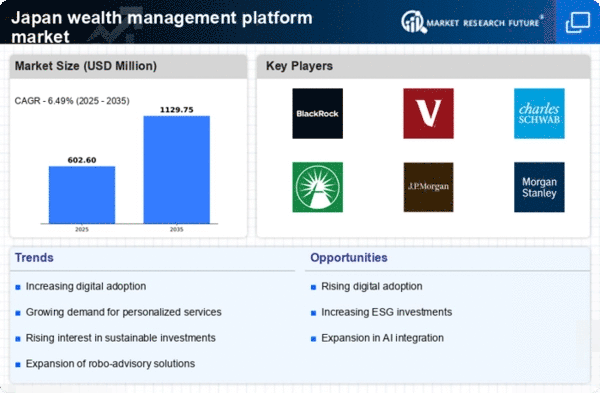Growing Affluence Among the Population
Japan's wealth management-platform market is significantly influenced by the growing affluence of its population. As the economy continues to recover, a rising number of individuals are entering higher income brackets, leading to an increased demand for wealth management services. Reports indicate that the number of high-net-worth individuals (HNWIs) in Japan has increased by approximately 5% annually, creating a larger client base for wealth management platforms. This demographic shift is prompting firms to tailor their services to meet the unique needs of affluent clients, thereby driving growth in the market. The wealth management-platform market is likely to see continued expansion as more individuals seek professional guidance in managing their assets.
Rising Interest in Alternative Investments
The wealth management-platform market in Japan is witnessing a growing interest in alternative investments. As traditional asset classes face volatility, investors are increasingly looking towards alternatives such as private equity, real estate, and hedge funds. This shift is driven by the potential for higher returns and diversification benefits. Recent data suggests that approximately 30% of wealth management clients in Japan are now allocating a portion of their portfolios to alternative investments. Wealth management platforms are responding by expanding their offerings to include these asset classes, thereby attracting a wider range of investors. This trend indicates a significant evolution in investment strategies, as clients seek to enhance their portfolios amidst changing market conditions.
Regulatory Changes and Compliance Requirements
The wealth management-platform market in Japan is also shaped by evolving regulatory changes and compliance requirements. The Financial Services Agency (FSA) has implemented stricter regulations aimed at enhancing transparency and protecting investors. These regulations compel wealth management firms to adopt more robust compliance frameworks, which can be costly but ultimately beneficial for market integrity. As of November 2025, firms that proactively adapt to these regulatory changes are likely to gain a competitive edge. The emphasis on compliance not only fosters trust among clients but also positions firms favorably in a market that increasingly values ethical practices. This driver indicates a shift towards a more regulated environment, which may reshape the competitive landscape.
Technological Advancements in Financial Services
The wealth management-platform market in Japan is experiencing a notable transformation due to rapid technological advancements. Innovations such as artificial intelligence and machine learning are enhancing the efficiency of financial services. These technologies enable platforms to offer personalized investment strategies, thereby attracting a broader client base. As of 2025, it is estimated that over 60% of wealth management firms in Japan are integrating advanced technologies into their operations. This shift not only improves client engagement but also streamlines operational processes, making wealth management more accessible. The increasing reliance on technology suggests that firms that fail to adapt may struggle to compete in this evolving landscape.
Increased Demand for Customized Investment Solutions
In the wealth management-platform market, there is a marked increase in demand for customized investment solutions. Clients are increasingly seeking personalized services that align with their individual financial goals and risk appetites. This trend is particularly pronounced among younger investors who prioritize tailored experiences over traditional offerings. As a result, wealth management platforms are investing in technology to provide bespoke solutions, including personalized portfolio management and financial planning services. The market is witnessing a shift towards more client-centric approaches, with firms that can effectively deliver customized solutions likely to thrive. This driver highlights the importance of adaptability in meeting the diverse needs of clients in a competitive landscape.
















